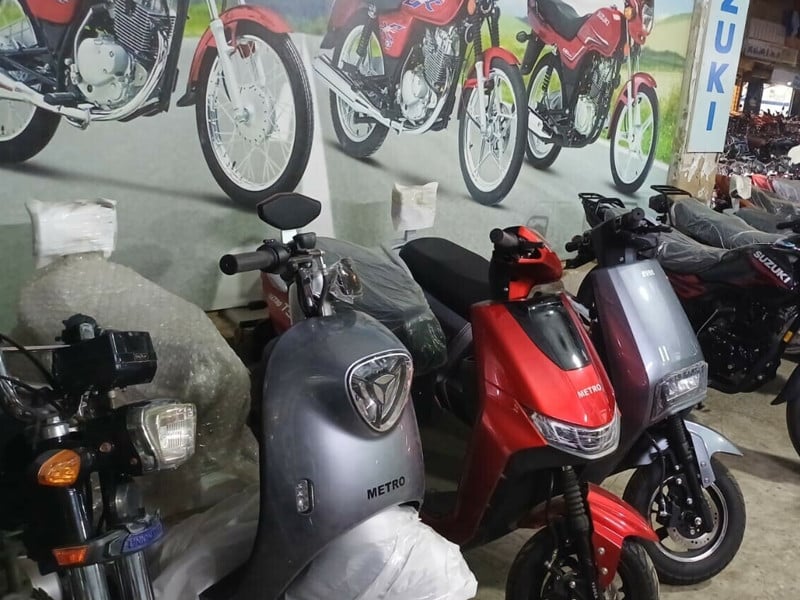KARACHI:
Despite economic slowdown and political instability, sales of electric motorbikes grew in 2024 and are expected to rise manifold in 2025, if the upcoming New Energy Vehicle (NEV) policy facilitates all stakeholders such as investors, assemblers, parts vendors and customers, plugs lacunae, streamlines the cumbersome registration process and maintains the quality of EVs.
Localisation of parts, which is unavoidable, is being procrastinated inordinately because of the work on finalising some successful models of electric motorbikes.
Local people are assessing new and latest models as China is rapidly spawning a string of advanced and comfy electric bikes. It will take two to three years before some durable models of electric motorcycles are finalised.
The Engineering Development Board (EDB) should relinquish the six-month tedious process of approving the latest EV models and adopt an easy and quick modus operandi.
The gradual penetration of e-bikes is continuing as roughly 50,000 electric scooters were produced and sold in financial year 2023-24, while only 15,000 units were assembled and sold during 2022-23.
Climate Action Centre Founder and Director Yasir Husain said owing to the spreading poor air quality, 100% NEV motorbikes including electric, retrofitted and hybrid will gradually replace gasoline motorcycles to ensure a pollution-free environment, reduce health hazards and provide a cheaper source of transportation.
He said the government was about to introduce the NEV Policy 2025 by offering attractive incentives to both NEV industries and end-consumers. Bank financing schemes will be unveiled for assemblers and buyers for setting up plants and purchasing motorbikes, respectively, at zero interest rate. To encourage motorcyclists, the government may also give handsome subsidies on e-bikes.
Husain called for establishing a fully-fledged mechanism for the recycling of motorbike batteries while curbing environmental pollution.
Yadea Pakistan Managing Director Muhammad Salman Tanveer said Graphene batteries must be included in the NEV policy 2025 as it was a tested, affordable technology that could be recycled. It is a successful technology of 2024 but propaganda is being made by some motorcycle companies that lithium batteries are better than Graphene batteries.
In Sri Lanka, Nepal and Bangladesh, Graphene batteries are gaining popularity because of features such as low cost, a near-perfect conductor of electricity, faster charging, dramatically reduced heat generation and better energy density. Large-scale adoption of e-bikes is possible with this battery technology, if the government lends support.
The government must dole out a significant subsidy for promoting EVs and replacing fuel-driven motorbikes with eco-friendly bikes.
“Nowadays, many assemblers are entering this emerging industry but they do not focus on quality while some are working without proper standards, which does not augur well,” Tanveer said.
The EDB must evolve a strategy and chalk out clear-cut guidelines to curb the assembly of such motorbikes, which may discourage the enthusiastic riders intending to switch over to EVs.
“A significant growth in EVs was witnessed last year (2024), while this year sales are expected to double because of good feedback from consumers,” Tanveer said.
“At the same time, inflation is going down and foreign exchange reserves are swelling on account of better economic indicators. The government must set a negligible fee or offer free-of-cost registration of e-bikes and raise the registration fee for fuel-driven bikes with a view to reducing the oil import bill,” he added.
According to auto sector analyst Muhammad Sabir Shaikh, until the government is able to draw up a useful policy and rules, facilitates assemblers, parts vendors and investors, and gives incentives to riders, common people will not take much interest in EVs.
Investors and end-users are afraid of investing and buying e-bikes because of an ambiguous and uncertain policy. If a policy is formulated, it must be implemented in true letter and spirit, otherwise people will flout rules. Additionally, customers are uncertain about the resale value of EVs.
“The government can play an important role in dispelling confusion with a pragmatic strategy,” Shaikh remarked.
China introduced strict rules along with attractive incentives to promote EVs in initial stages and now 60% e-bikes are plying its roads. Also, 40% of rural and impoverished areas in China will be able to adopt electric bikes within two to three years.
Pakistan’s government must stop “the demand for speed money or cuts” during the registration of vehicles and take stern action against corrupt officials. The registration process should not be a tall order and authorised dealers must be empowered to register customer bikes online without any hindrances.
“In addition to kickbacks and bribes, the registration process consists of 1% of the actual value of the bike, Rs1,650 for smart card and Rs1,850 for number plate. These are unfair charges,” Shaikh said.
According to a presentation made by The Bank of Punjab President and CEO Zafar Masud at a recent conference, opportunities in Pakistan include local assembly, cost-effective EVs, infrastructure development and trade incentives.
As far as environmental factors are concerned, severe urban air pollution underlines the need for cleaner transport, in alignment with Pakistan’s commitment to the Paris Agreement.
The economic benefits encompass reduced fuel import cost, better payback for customers, local assembly and charging network, job creation, EV policy targeting 30% penetration by 2030, import duty reduction and tax exemption to lower costs for consumers and manufacturers.
The target segments for two, three and four-wheeler EVs are the large youth population and urban dwellers.
Still, the EV sector faces challenges which include uncertainty about resale value, limited battery warranty and useful life, localisation of parts, high upfront cost and depreciation, lack of government support, high interest rates, project financing, charging stations, economic and geopolitical scenarios, policy and poor road infrastructure.










